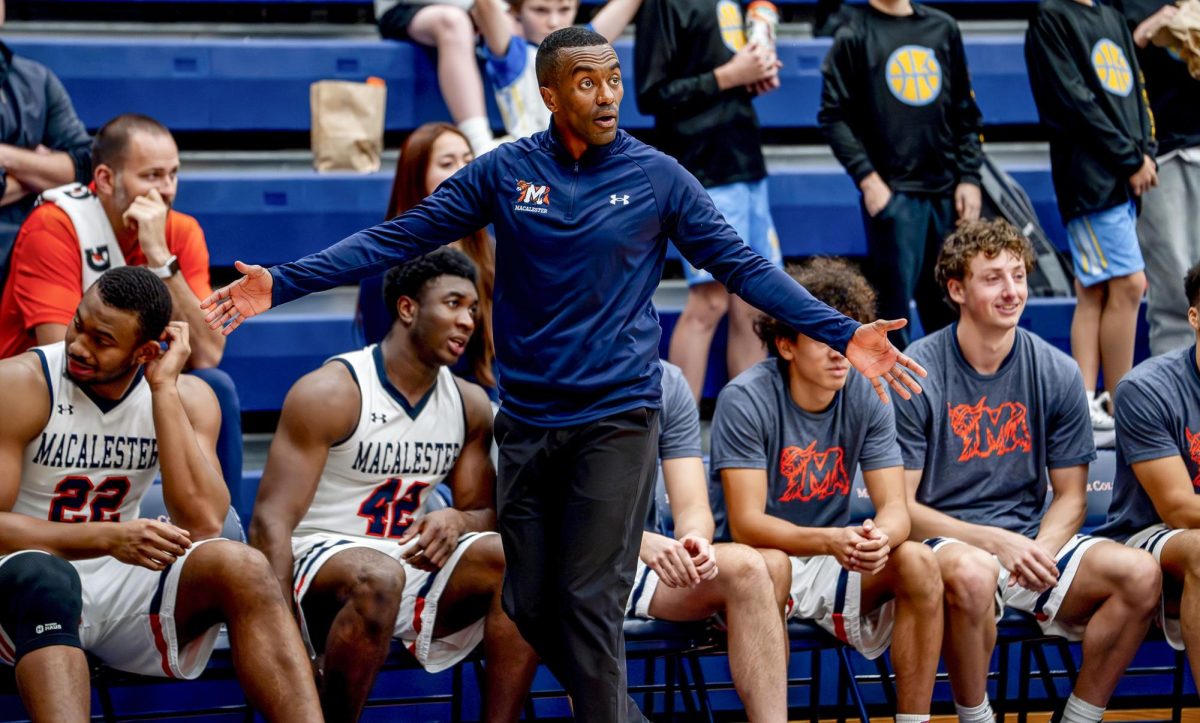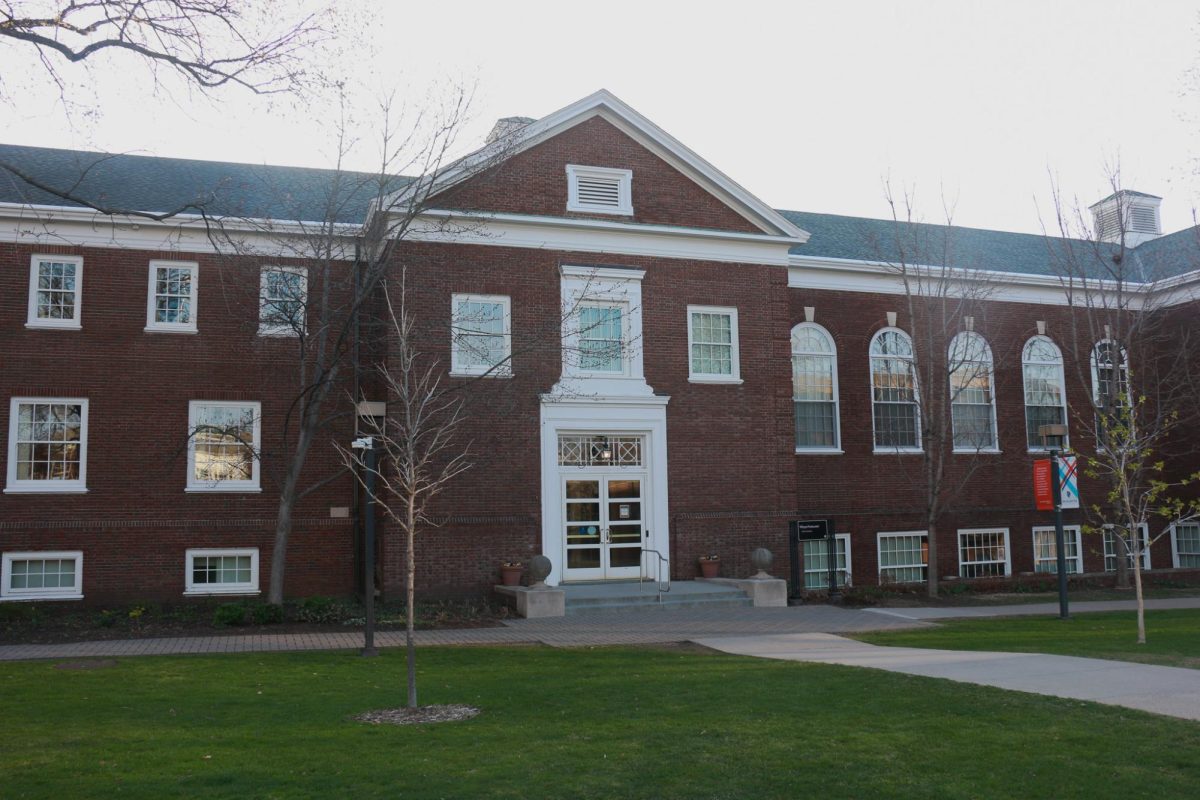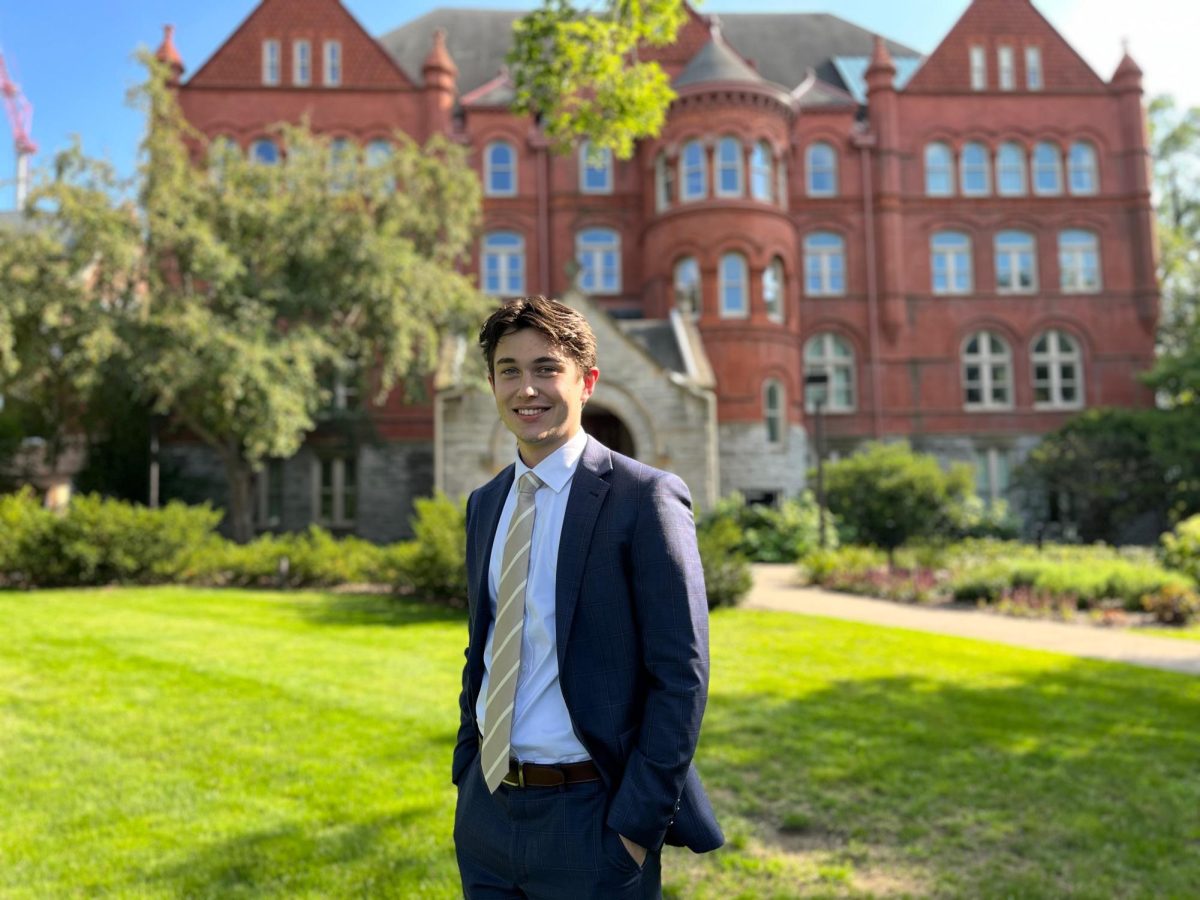The following is part of an interview that was conducted with Macalester President Brian Rosenberg in September. The transcript has been lightly edited for clarity.
TMW: I noticed that in your first-year orientation talk a couple of big themes were ‘you belong here’; ‘you’re not alone here.’ Were you influenced in that by what happened last year [the death of Matias Sosa-Wheelock by suicide]?
PBR: Absolutely. By what happened and also by just the more general question of the mental health of our students and this generation. I mean, all the evidence suggests that there’s an enormous amount of anxiety in this generation of students, despite the fact that you step into a community of 2,000 students and it’s really common for students, particularly students from lower socioeconomic backgrounds, first-generation students, [and] students of color to feel isolated or feel like it’s the imposter syndrome – I really don’t belong here.
If people ask me what my biggest worries are, the economic one is sort of the big picture one. But day-to-day, my biggest worry is just the well-being of our students. I don’t wake up every morning thinking ‘are we going to be financially viable in 15 years?’ But I do wake up every day on some level thinking, ‘I hope nothing bad happens to a student today.’ So it was very conscious.
Right now, for me, the two areas I think we really need to focus on in terms of student well-being are mental health, and then, as we become more diverse as a community, making sure that we have an inclusive environment on campus. If we can get better at those two things, that’ll really be meaningful.

TMW: I think the number one complaint I hear about you from students has to do with your salary. Are there responses you have to people who say, ‘we could pay everybody a living wage who works here if we were paying the president –
PBR: Believe me, I’m aware of that, and it’s not fun. First of all, the numbers are often misreported and misunderstood. People always pick the biggest number they actually can, so the number that they cite is the total compensation number – and that includes things like benefits, like healthcare, which adds about 20 percent to every person’s salary.
First of all, I don’t set my own salary. It’s dictated to some extent by the market. Our Board [of Trustees] benchmarks my compensation very carefully against other presidential compensation at other similar institutions, and we have that looked at by a consultant. My salary is given the fact that I’m in my 16th year, and [given that] it’s about where it should be – relative to peers, not to some independent sense of what’s just. People also have to remember that I don’t have tenure. Presidents, unlike even provosts and faculty members – a faculty member has essentially guaranteed – you can work at Macalester once you get tenure for the rest of your life. The average presidential tenure now is about five or six years. And so when you go into one of these jobs, part of the deal is, alright, you’re going to get a pretty high salary, but you’re not going to have a lot of security.
Now, I’ve managed to last a longer time than most, which means my salary – if you look at my raises over the last decade, on average they’re lower than the raises for faculty and staff because there are some years I’ve taken none, and then most years I just take the base of what everybody gets. But you stay long enough and it keeps going up.
Then the other thing I’d say, and I don’t like to talk about this a lot, but I give a lot of it back. I’ve given, in my time at Macalester, by the time this campaign is done, I think it will be close to half a million dollars back. When I do that, and I get pummeled, it is a little frustrating. Who wouldn’t be a little bit bothered by it? I know there are people who think, oh, you should pay the president – well I don’t what they think you should pay the president. Sometimes students don’t realize, there are a lot of faculty members who are getting six-figure salaries.
TMW: One of the very famous stories is of the CEO who lowered his salary to $70,000 and everybody in the company was paid roughly the same thing.
PBR: But see, I’m not rich.
TMW: And I’m not saying you’re in that position, I’m saying that may be what people have in mind.
PBR: No, I know they’re thinking that, but what people have to remember is that in my first fifteen years of my career I was an English professor. And my starting salary when I was an English professor was $15,900. Then I was a dean, and my starting salary as a dean was lower than an average full professor’s salary at Macalester. So yeah, the last phase of my career I’ve been very well compensated. But it’s not like I’m a CEO of a Fortune 500. If my salary is three times the highest full professor’s salary, it’s not the CEO of 3M where your multiple [is] thousands.
Let’s say for the sake of argument you’re going to pay the president $200,000. You’re not going to hire anybody good. Someone would take the job, but it’s probably not someone that you’d want.
I also don’t understand quite why they’re mad at me rather than the Board of Trustees. How many people exist in the labor market and say, ‘I don’t want to get paid’ – it’s a lawyer going into a law firm and saying ‘you know, here’s what you pay starting associates, but I don’t want that. I want a third of that. Or a physician, or anybody – how many people exist in a labor market and say, I want to not get paid consistent with that market. The president gets blamed for everything. But if you really want to get mad at anyone, it should be the Board of Trustees.
TMW: The last thing is that you said that five years is the average tenure [of a college president]. You’ve been here 16 years. I remember the first time we talked about this campaign was a couple of years ago, and you said then that this was going to be your last campaign as president of the college. Is that still the plan?
PBR: It’s my last campaign. Yep.
TMW: And do you have an idea of a timeline for taking off?
PBR: Yes, I do. Am I going to tell you right now? No.
TMW: Fair enough.
PBR: But I do. I have an idea in my head of my timeframe, and, when the time is right, I’ll make that public. But right now it’s in my head.
TMW: Sure.
PBR: But I have made a promise to myself from day one that I try not to outstay my welcome. And maybe in the view of some people I already have. I don’t want to be around a campus where people say, ‘when’s he going to leave already?’ I’d rather leave before that happens. And again, for all I know it’s happened already, but I have my own timeframe for that.
TMW: But you will stay through the end of the [Macalester Moment] campaign?
PBR: Yes. I owe that to the college. It’s really hard for a college when a president leaves in the middle of a campaign. That tends only to happen when someone gets fired or they just leave because they want to take a job that they think is a better job. I think I’ll do something after Macalester, but I will never be a college president again. I could not generate the engagement again with another institution that I feel with this one. So I don’t see myself just sitting around and doing nothing, but it will be something else.
TMW: Is this a job after 16 years that you still enjoy? Is it still stimulating?
PBR: It’s definitely stimulating, and there’s a lot about it I enjoy – not every moment every day, but yesterday I spent an hour with [Assistant Dean for College Access, Retention, and Success] Sedric McClure and [Associate Director of Educational Partnerships for College Access & Success] Ruth Janisch and all the students they work within the Bonner program and other programs, and I loved it. I talked for a little while and then I just answered their questions, and they were great questions. That hour I loved. It was, like, ‘this is so much fun.’ These kids are amazing. But then, you know, someone sues you, it’s not fun.












Chloe Butler • Sep 9, 2019 at 12:22 pm
This is my first time go to see at here and i am genuinely pleassant to read everthing at one place.
Kimble Johnson • May 13, 2019 at 7:58 pm
You have a bunch of non-entities squabbling about the man’s salary. Most college snowflakes don’t like our free market system. They think everyone should earn the same. First of all, “everyone” doesn’t have the skillset to run a college, or 3M. Gaining that skillset takes a great deal of time and dedication, much more than your average snowflake would ever put into anything. In the ‘school of hard knocks’ there are no comfort animals.
Second, there has to be an incentive system that rewards those with the most useful skillset. The market does this. No snowflake would ever begrudge a rock star or athlete from earning $20 Million a year, but somehow, someone who can truly make a difference in many lives is begrudged one tenth of that.
Paul Scott • Dec 18, 2018 at 10:59 am
I am an alum (1986) and former Mac Weekly columnist. Bravo Abe on asking him about his pay. Four years ago I wrote an essay in the Star Tribune about the president’s deeply disappointing pay situation — he is overpaid — called “How Much Would You Pay a Person to Run a College?” You can Google it if you’re interested. He never responded. I had hoped that as president of a college he would approach the question with more humility than this. His answers here are mansplaining, defensive, tone deaf, and unpersuasive.
Jane • Dec 8, 2018 at 3:21 pm
One of the things that especially irritates me about this is the portion where PBR asks us to blame the Board of Trustees for his salary, rather than himself, and then cites as examples that we don’t expect lawyers to voluntarily take less pay, or a physician to do that, or for anyone to ask to be paid less than the general compensation in the market for their work. First of all, I don’t accept that example. We expect teachers, who often times hold graduate level degrees, to accept compensation far below their peers in terms of hours worked per week and education level. We expect that people will graduate from law school, incur an enormous amount of debt, and then decide to work in some form of public interest law, despite the fact that they will make a great deal less than their counterparts who go into private practice. I can’t speak for other students, but I am frustrated with the Board of Trustees over certain issues. But that doesn’t mean that I can’t also be frustrated with PBR over this. It’s not as if he’s someone who has no control in this situation. He makes more being the president of this college than 99% of workers in this country, and he could absolutely say “I don’t need this level of compensation, I can settle for making $200,000 a year and request that you put the rest of that money towards paying everyone who works here a living wage, towards hiring more faculty, towards allowing for more financial aid.” I admit that I don’t know how much power he would really be able to have in directing where that money would go to, but I highly suspect it is not nothing. I don’t think asking him to do that really would be such a ridiculous thing to ask, even if no one else in his position is doing that. He’s still enjoyed enormous compensation for the work that he does for the past years of his career, he still gets a home for free, and that 20% of his compensation that are his benefits–that’s not money that’s just going nowhere. As he says, that goes to things like healthcare, which is a significant expense and anxiety for most Americans. I’m just frustrated with his tone in this interview surrounding his wealth because it demonstrates how extremely disconnected he is from most people, who don’t receive over $700,000 worth of compensation every year. It’s nice that he’s given back so much to the college, but that doesn’t really change the situation, and the fundamental inequities he is a part of. I also really hate his implication that because he worked for so long making so much less than he currently makes, he’s somehow entitled to this amount of money. No one is entitled to $700,000 worth of compensation. It doesn’t matter if that’s comparable to the compensation of other college presidents– no one is entitled to that amount of money. He says in the interview that his salary is determined by what other college presidents make, not some independent notion of what is just. But he could determine his salary by that notion, and still live an extremely comfortable lifestyle. And if he’s not going to do that-if he’s just going to say that he’s a product of the system that currently exists, that he has no control, is not accountable, that we should blame the Board of Trustees–then he has to own up to the fact that he is participating in and actively supporting and benefitting from a system of enormous income and wealth inequality that endangers people’s lives and their access to basic human needs. And he certainly needs to admit that he is rich.
Alexis Texis • Dec 7, 2018 at 3:05 pm
“But see, I’m not rich. ” — Man who lives for free in mansion while getting paid 700k per year to attend fundraisers